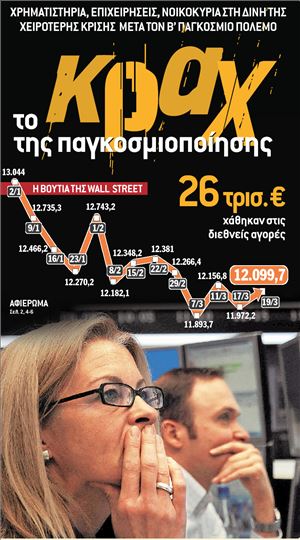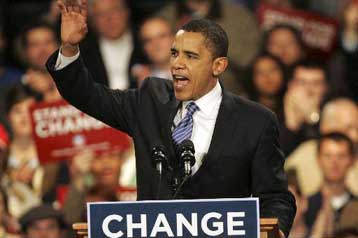Είναι μάλλον βέβαιον ότι μετά είκοσι έτη, ζούμε πλέον το τέλος του Θατσερισμού.
Αποδεικνύεται την τελευταία πενταετία ότι η περίφημη ικανότητα της αγοράς για αυτορρύθμιση (και μάλιστα για αυτοδιόρθωση) δεν ήταν παρά το πέρασμα από τη μία κρίση στην άλλη· με την ομοιοπαθητική της ίασης όχι μόνον να μη λειτουργεί, αλλά αντιθέτως, απωθώντας τις συνέπειες της μιας κρίσης στις συνιστώσες της επόμενης, να καταλήγει σε έναν γιγαντισμό της παθολογίας του συστήματος ανυπόφορον. Το σύστημα είναι πλέον ένα ζόμπι που δεν μπορεί να υποφέρει τον εαυτόν του.
Στρέφεται τώρα απελπισμένο, προς κάποιαν ανακούφιση, στο κράτος, το οποίο στο μεταξύ έχει αποψιλώσει...
... κι αρχίζει να προσεύχεται στον Κέυνς (ενώ μέσα του τρέμει τον Μαρξ).
Οσο για τους προφήτες του νεοφιλελευθερισμού, που με τόσον αίμα (πάνω στο κεφάλι τους και) στα χέρια τους, έγραφαν τόσα χρόνια τις ωδές τους προς τη νέαν εποχή, τώρα τους βλέπουμε να σκούζουν ότι δεν φταίει ο νεοφιλελευθερισμός, αλλά το ότι ποτέ δεν... εφαρμόσθηκε σωστά! Οτι δηλαδή
ουδέποτε το θηρίο αφέθηκε τελείως ελεύθερο κι αν στο μεταξύ έφαγε τον μισόν πλανήτη φταίει που ήταν ολίγον δεμένο. Αλλοιώς διά της αυτορρυθμίσεως (ου μην
και της αυτοδιορθώσεως) θα τον είχε φάει όλον, δεν θα ετίθετο θέμα, δεν θα είχε μείνει κανείς για να γκρινιάζει.
*****
Με έναν οικτρό αλλά και ειρωνικόν τρόπο θυμίζει ο θρήνος των νεοφιλελεύθερων την απολογητική των «οπαδών» του κομμουνισμού όταν έλεγαν (το ίδιο ακριβώς που ισχυρίζονταν και οι εχθροί του): καλή η θεωρία, αλλά στην πράξη απέτυχε...
(σημείωση: ο σταλινισμός απέτυχε, όχι ο σοσιαλισμός -για αυτό και χρησιμοποίησα τη λέξη «οπαδοί»- αλλά αυτό είναι μια άλλη ιστορία). Πάντως υπάρχει ένας κοινός παρονομαστής μεταξύ νεοφιλελεύθερων και σταλινικών: η χυδαία αντίληψή τους για την οικονομία. Από κει και μετά ο δογματισμός είναι αναπόφευκτος.
.........................................................................
Αν πολιτική είναι η διαχείριση των φαινομένων που παράγουν οι οικονομικές σχέσεις σε μια κοινωνία, αναλόγως του συσχετισμού των τάξεων μέσα σε ένα κράτος, εν σχέσει με το διεθνές περιβάλλον του
τότε η αποθέωση της οικονομίας (είτε από τους νεοφιλελεύθερους, είτε από τους κρατιστές) οδηγεί σε μια θρησκειολογική (μάλιστα σωτηριολογική) αντιμετώπιση της πραγματικότητας. Ο δογματισμός αυτός είναι ως εκ της φύσεώς του αντιδραστικός, είτε εκφράζεται με τον ιμπεριαλισμό του καταπιεστή, είτε με τον φονταμενταλισμό των θυμάτων του.
Κι έτσι σε αυτήν την εικοσαετία του -βασιλιά- νεοφιλελευθερισμού
πολύς πλανήτης φαγώθηκε, πολύς πόλεμος επεκράτησε, πολύ φτώχεια απλώθηκε, πολύς πλούτος συγκεντρώθηκε. Αυτό έγινε κατορθωτό με πολλή τηλεόραση, ικανή κρατική τρομοκρατία, με τον ευνουχισμό (και αυτοευνουχισμό) των διανοουμένων, με την κυριαρχία, μέσω των ΜΜΕ, πολλών νέων «κατά συνθήκην ψευδών». Αποτέλεσμα: η απαξίωση της εργασίας, ο αποχαιρετισμός στο 8ωρο (κι όλες τις δυνατότητες που παρείχε στον βίο), η απίσχνανση των ασφαλιστικών συστημάτων, η απαλλοτρίωση της εκπαίδευσης, η εφ' όρου ζωής χρέωση των νοικοκυριών στις Τράπεζες, η πολιτισμική οπισθοδρόμηση.
***
Φτωχότεροι, χρεωμένοι (κι εν πολλοίς χαζοκουτιασμένοι) οι παλιοί, κι απελπισμένοι οι νέοι. Πλην πλουσίων όλο και περισσότερη προλεταριοποίηση της πολλά κολακευμένης απ' τον Θατσερισμό μεσαίας τάξης, αυτή είναι πια η «νέα οικονομία»...
Τώρα, αιδημόνως, οι προφήτες του νεοφιλελευθερισμού κατεβαίνουν διακριτικά απ' τους μιναρέδες του μεταμοντερνισμού, της πολιτικής ορθότητας κι όλων των άλλων κλισέ που επί χρόνια μας έριχναν κατακέφαλα. Μαζί τους εξίσου αιδημόνως κατεβαίνουν και οι προδότες της Αριστεράς. (Αν και αυτοί είναι πιο πεισματάρηδες, πολεμούν σαν τα διεθνή βάφεν Ες-Ες πιο φανατικά απ' τα γερμανικά βάφεν Ες-Ες. Κρατάνε τις θέσεις τους με πείσμα, στα ΑΕΙ και στα ΜΜΕ κυρίως, έχουν πολλά να χάσουν.)
Ομως, με το ένα και με το άλλο (κι ώσπου να εννοήσεις, γέρασες) όλα αυτά τα χρόνια ο αμερικανικός τρόπος ζωής μάς κόστισε πολύν θάνατο. Οψόμεθα...
Αλλά είναι τραγικό (και ένας απ' τους λόγους για τους οποίους κλονίζεται και ο δικομματισμός), τώρα που στα μάτια των μαζών έχει αρχίσει να φαίνεται πόσον γυμνός ήταν ο Θατσερισμός, τώρα ακριβώς να τον ενδύεται έως τα άκρα η κυβέρνηση Καραμανλή.
Με τη συνήθη καθυστέρησή της, δεκαετίας-εικοσαετίας, η Ψωροκώσταινα ακολουθεί κατά πόδας τους άλλους κατά διαόλου...
ΣΤΑΘΗΣ Σ. 24.ΙΙΙ.2008 stathis@enet.gr
Η ύφεση, οι αγορές και η Ελλάδα
Ο ρόλος του κράτους στις σύγχρονες οικονομίες
Η κατάρρευση της επενδυτικής τράπεζας Bear Stearns επανέφερε στο προσκήνιο το ερώτημα περί του ρόλου που διαδραματίζει το κράτος. ΑΛ. ΚΑΨΥΛΗΣ * σελ. ...
Ζαλίζει το ασανσέρ των αγορών
Οι διεθνείς οργανισμοί περιγράφουν την παρούσα κρίση ως τη δεύτερη μεγαλύτερη τραπεζική κρίση των τελευταίων 100 χρόνων. Σύμφωνα με στοιχεία του ΔΝΤ και προβλέψεις της UBS, το κόστος της κρίσης ως ποσοστό του ΑΕΠ θα είναι το δεύτερο υψηλότερο της περιόδου, υστερώντας μόνο της ιαπωνικής τραπεζικής κρίσης την περίοδο 1990-1999. Η εβδομάδα που πέρασε ήταν δραματική για τους επενδυτές. Αρχισε σε συνθήκες πανικού στις χρηματιστηριακές αγορές όλου του κόσμου μετά την κατάρρευση της ...
Η κρίση ακυρώνει το μοντέλο των επενδυτικών κεφαλαίων
Από τον νεοφιλελευθερισμό στον νεοπροστατευτισμό: οι διεθνείς χρηματοπιστωτικοί οργανισμοί και οι μεγαλοτραπεζίτες που ενθάρρυναν τη γιγάντωση και τη διείσδυση των hedge funds στις αναδυόμενες αγορές της Ανατολής τώρα κλείνουν τις πύλες της Δύσης στα εξ Ανατολών ορμώμενα κρατικά επενδυτικά κεφάλαια. Πόσο εύκολο όμως είναι εν τέλει για τη Δύση να αρνηθεί το «ζεστό» χρήμα των Αράβων, των Ρώσων και των Κινέζων; Γ. ΤΣΙΑΡΑΣ * σελ. ...
Η δεύτερη χειρότερη κρίση της τελευταίας εκατονταετίας
Ως η δεύτερη μεγαλύτερη τραπεζική κρίση των τελευταίων 100 χρόνων εξελίσσεται η πρόσφατη χρηματοοικονομική αναταραχή, η οποία, αν και άρχισε με κακούς υπολογισμούς σε «στοιχήματα» σε χρεόγραφα υποστηριζόμενα από στεγαστικά δάνεια υψηλού ρίσκου (subprime) στις ΗΠΑ, στη συνέχεια συνέβαλε στον περιορισμό της ρευστότητας μεταξύ τραπεζών και φαίνεται ότι τώρα λαμβάνει παγκόσμιες διαστάσεις, καθώς η κρίση αξιοπιστίας κυριαρχεί. Σύμφωνα με στοιχεία του ΔΝΤ και με προβλέψεις της ...
Οι ημέρες που συγκλόνισαν τη Γουόλ Στριτ
Η κατάρρευση ενός εκ των μεγαλυτέρων επενδυτικών ομίλων της Wall Street αποκάλυψε ότι η έκταση της κρίσης ρευστότητας στην αμερικανική αγορά είναι πολύ πιο βαθιά και εκτεταμένη από όσο υποψιάζονταν - ή έστω παραδέχονταν δημοσίως - οι αναλυτές. Η πώληση της Bear Stearns στην ανταγωνίστριά της JP Morgan Chase έτσι όπως έγινε, δηλαδή αντί πινακίου φακής, με χρήματα των αμερικανών φορολογουμένων και καθ' υπέρβαση των κανόνων και πρακτικών που διέπουν το αμερικανικό ...












